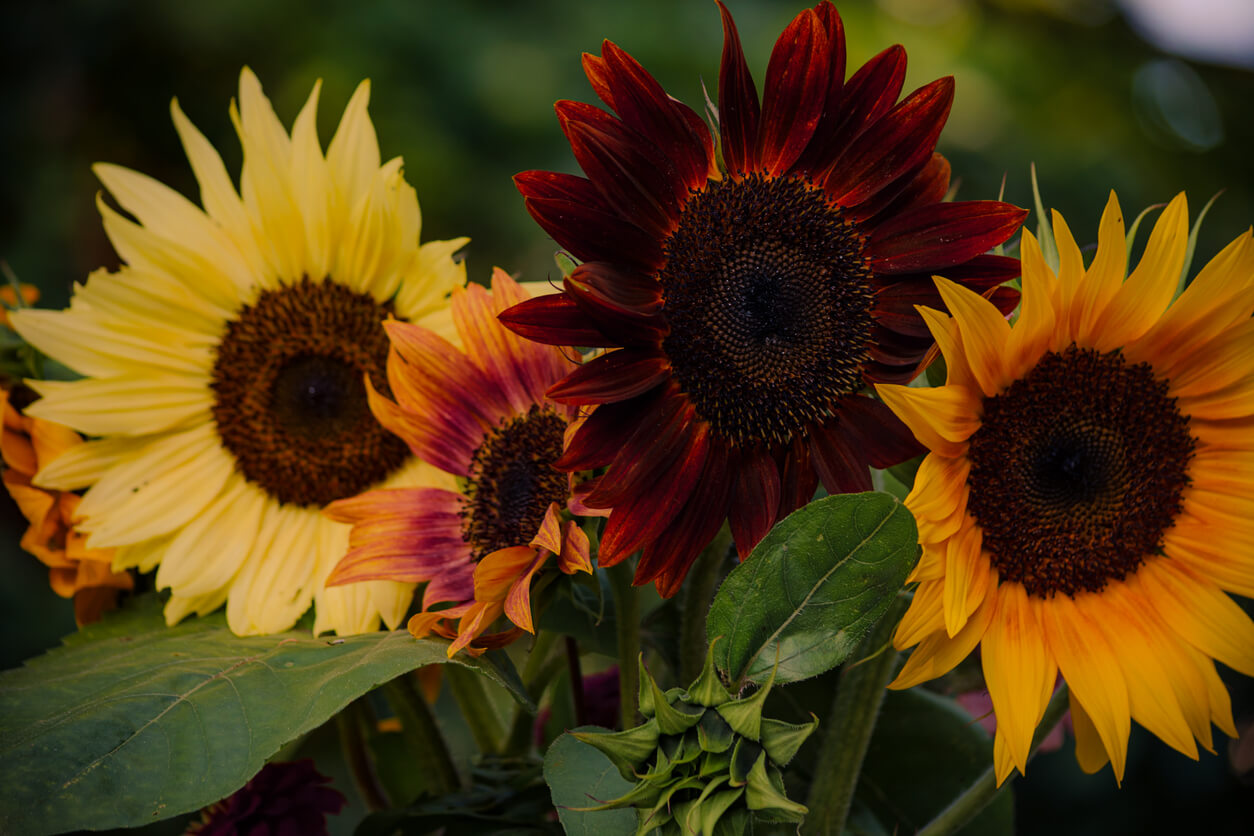
Vibrant colorful variety of natural sunflowers
Annual Sunflowers
Sunflowers grown for food tend to be the annual variety: Helianthus annuus. These annual varieties come in a wide range of sizes, heights, and colors, ranging from 2 to 4 feet to a towering 12 feet or more.
Annual sunflowers come in two different main types:
- Branching (multi-headed): These are smaller, bushy, multi-stemmed plants that produce many flowers over the season. They can range from 2 to 8 feet, providing a profusion of bright blooms. While these sunflowers produce seeds, they tend to be more ornamental than edible, although some flowers are very tasty on salads, and you can roast the whole flower. Varieties include:
- Sonja
- The Joker
- Shock-O-Lat
- Teddy Bear
- Upright (single-headed): These are probably the sunflowers that come to mind when you hear the word sunflower: tall stalks topped with plate-sized flowers with bright petals ringing the seeded center. You only get one flower per plant, but what a flower it will be! These are the culinary sunflowers gardeners grow most often for a hefty seed harvest. Varieties of single-headed sunflowers include:
- Cyclops
- Mammoth
- American Giant
- California Greystripe
- Sunzilla
If you’re growing sunflowers primarily to harvest the seeds, you can grow varieties that are as tall as 14 feet or as short as 16 inches. You have plenty of growing options (and you don’t have to stick with just one variety, either!).
Perennial sunflowers
Perennial sunflowers are not as popular as a food source; they have smaller blooms and fewer seeds. Ranging in height from 2 to 10 feet, they do have a longer blooming season than annual sunflowers and are more popular for flower gardens.
Perennial sunflowers produce underground tubers instead of a taproot. Those tubers reproduce and spread out, breaking up soil as they go. They can become a problem if they start crowding out other plants. On the bright side, the tubers are edible, so the plant won’t go to waste if you have to dig it up.
Seeds labeled H. angustifolius, H. debilis, and H. maximiliani are all perennial species.
Perennial sunflowers include:
- Beach sunflower, Soluna Lemon: This plant is hardy in zones 9 and 10, and just as its name indicates, it tolerates salt, sandy soil, and lots of sun.
- Maximilian: This plant has the typical look of a meadow wildflower—mostly because it is. It’s native to North America, and First Nations peoples grew this sunflower for its edible rhizome. The petals are edible, too. This plant, hardy in zones 3 to 9, is mostly used for its ornamental value.
- Swamp sunflower: This plant is hardy in zones 4a to 9a and produces blooms about 3 inches across. The flowers are attractive to songbirds and pollinators, but these are not culinary flowers.
If you want to grow sunflowers for their delicious seeds (and more), you’ll want to stick with upright annual varieties with white, grey, or grey and white stripes.
Black oil sunflowers
If you want sunflower seeds for their oil, varieties with black seeds are best. Black Peredovik, Red Sun, and Valentine are good choices for black oil sunflowers. You could also plant some black oil sunflowers as a sort of trap crop to lure squirrels and birds away from your culinary sunflowers. These critters will eat the black sunflower seeds before the grey striped ones because of the higher level of oil and protein in the black seeds.
Have you tried growing annual or perennial sunflowers? Which do you prefer? Do you grow your sunflowers for food or show? Snacking or oil? Please share your sunflower experience in the comment section below.


 Previous
Previous


very informative